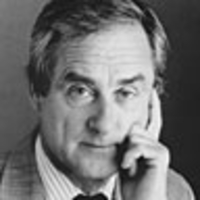Is Ralph Nader dreaming? When you hear what he has to say in Unstoppable about the emergence of a new bipartisan politics, you may be inclined to scoff. After all, this Don Quixote has tilted at the White House five times and five times broken his lance, and the exuberant optimism in his new book is at odds with the great glumness of our fractured times.

But check your skepticism. Nader, successively demonized and lionized, has consistently confounded naysayers by the insights from his intensively researched social campaigns. This time he is not erecting a platform for another run at the presidency, not endorsing a messiah candidate, not outlining a program for a political party. On the contrary, he is excited because his researches in D.C. and in countless grassroots meetings convince him there is a way to escape head-butting party politics altogether. He discerns it in the many surprising victories achieved by partnerships of conservative and progressives willing to put their party labels aside for a specific objective and only that. The little-noticed temporary alliances have been born out of frustration with the gerrymandered gridlock in Congress. They are being created on the run with popular support in the constituencies but with no other objective than getting some one particular thing done.
Because he has spent his life as a critic, not a cheerleader, Nader’s Unstoppable will surprise many. For a Green candidate caricatured as an ultraliberal, he is eloquent in defense of conservative values. He sees no real obstacle to Left pragmatically co-operating with Right once dialogue is cleansed of the sterile ideologies either side. He is a judo artist worthy of a black belt in the way he leverages the strong words of conservative authorities—Adam Smith, Ludwig von Mises, Friedrich Hayek, Wilhelm Röpke—to upend the shrill neo-con dogmatists and Tea Partiers who have hijacked the traditional conservatism embodied in the deeds if not the words of Eisenhower, Reagan, and the elder Bush. “Conservatism has received a bad rap over the past century,” writes Nader, “and its philosophers have been misused, distorted, and sometimes wilfully mischaracterised in order to propagandize the public mind and cover crass commercialism with a moralistic philosophical camouflage.”
Unstoppable presents an altogether patriotic vision of America resuming the trajectory of greatness, its peoples no longer impotent before the corruptions of big money, crony capitalism, and the corporatist state, its discourse no longer demeaned by a shrivelled and cynical media.
I called on Nader in Washington last week on the release of his new book. When he’d uncoiled his 6’4” frame from canyons of files, I found him zestfully undiminished from our first encounter 40 years ago: He’s 81 next year, going on 18.
In the ’70s, I was the editor of The Sunday Times of London. We were investigating the poisoning of millions of mothers worldwide who ingested the German drug thalidomide, prescribed as an antidote for morning sickness. More than 100,000 of their babies died. Thousands were born gravely injured, many without arms or legs, yet all the families were denied compensation for more than a decade. The investigation was legally daunting. Many people ran a mile when we sought support. Not Nader. His energy and dedication helped us to win compensation in Britain, and only this year in Australia and Spain.
It’s piquant but chilling that Nader is publishing Unstoppable as the revived General Motors is trying to make good on the recall of millions of its cars, some with ignition switches blamed for 13 deaths.
The kid who began rebuking automakers for ignoring safety technologies when he was 25 got spied on and smeared by General Motors for documenting how it made cars Unsafe at Any Speed (the title of his seminal 1965 book). Mandatory seat belts, laminated windshield glass, collapsible steering wheels and air bags followed.
The campaign for a safe car was but the overture for Nader’s lifetime of reform and advocacy for the benefit of untold millions. Safer medicines. Scam-free hearing aids. Tractors that don’t roll over. Fairer credit. Decent nursing homes. Safer factories. Smoke-free air travel. It’s ridiculous for the Left to discount all this on the grounds that in 2000 Nader was a “spoiler” who threw the election to George W. Bush by taking votes from Al Gore. The simple arithmetic of the standard myth has more holes than the perforated chads in Florida’s Broward County: if 250,000 registered Democrats in Florida had not preferred Bush, Gore would have been president.
Nader’s classic heroes are Sen. John McCain (R-AZ) and Sen. Russ Feingold (D-WI), who took off their party badges to get campaign finance reform through Congress. Nader has a pantheon of convergers—as he calls those ready to cross an aisle to reach a compromise. Cue the knee-jerk rejectionists (Nader’s term) who will cite the subsequent sabotage of McCain-Feingold by the Supreme Court. It is hardly an advertisement for Nader’s thesis that the Court has come to vote along partisan lines with constitutional law more of a decoration than the pivot of the reasoning. But Chief Justice John Roberts did break the mold in upholding Obamacare in 2012, and amid the animosities there are green shoots for those willing to look. Sen. Ron Wyden (D-OR) converged with Kentucky’s libertarian Republican Sen. Rand Paul to legalize industrial hemp and with Alaska’s Lisa Murkowski (R) to force disclosure of donations over $1,000 in federal activity. Sen. Chuck Grassley (R-IA) and Rep. Howard Berman (D-CA) united in measures to stop fraud of the public treasury. Convergence is also gathering force in a shared revulsion for the consequences of the war on drugs. And in April, after Unstoppable had gone to press, Nader’s argument was showcased by Senators Kirsten Gillibrand (D-NY) and Susan Collins (R-ME), who got together on a bill to prevent military commanders from handling sexual assault cases that involve their subordinates. They missed by five votes, but getting 55 was a triumph. Gillibrand exulted: "This was one of the most bipartisan bills that we’ve seen in a long time. On the GOP side, we had Senator Collins and Chuck Grassley—well regarded moderates—but we also had Senator Ted Cruz and Senator Rand Paul.”
Reading Nader, one hears again the thrilling rhetorical declension of “red-state-blue-state-but-one-United-States” that put Obama on the road to the presidency. That vision has been crushed by the mastodons of national party politics. The ad hoc granular alliances described in Unstoppable promise less but may achieve more.
Harold Evans is author of The American Century and My Paper Chase.




